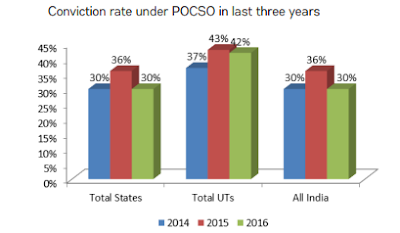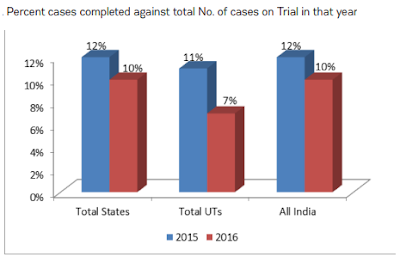In a revelation that should shake up India’s powers-that-be, “model” Gujarat, home state of Prime Minister Narendra Modi, is the slowest among Indian states in completing trial of pending cases of child sexual abuse. The Kailash Satyarthi Children’s Foundation, founded by India’s 2014 Nobel prize recipient, Kailash Satyarthi, has in a new report said, Gujarat would take anywhere between 55 and 200 plus years to complete child sex abuse trials.

If calculated on the basis of the absolute numbers of pending cases as on 2016, the report says, it would take 55 years for Gujarat to complete trials, but if the calculation is based on case disposal rate (again as on 2016), the state would “require more than 200 years to complete trial of pending cases.” Only two small states are found to be “competing” Gujarat’s 200 years mark – Arunachal Pradesh and Manipur.
 |
| 10 worst major states |
The best performing state – calculated on the basis of absolute numbers of cases of child sexual abuse as also case disposal rate – is Punjab, which would require just two years for completing trials, followed by Andhra Pradesh, Haryana and Chhattisgarh requiring 3 to 4 years, Tamil Nadu 4 to 7 years, Madhya Pradesh, Jharkhand and J&K 4 to 8 years, and Himachal Pradesh 6 to 11 years.
Titled “The Challenge Cannot Wait: Status of Pending Trials in Child Abuse Cases in India”, the report says that this state of affairs is there despite the fact the despite amendments brought about in the India Penal Code 1980, providing a wider definition of rape, seeking completion of investigation of child rape within two months of registration, and completion of trial, also within two months.
Pointing out that the “state timeline for pendency of cases of child sexual abuse” suggests that “the completion of trial is too slow”, the report states, on an average, it would take “almost two decades to clear backlogs” in the country. However, there are extreme state-level variations. Thus, “it varies from two years in Punjab to more than 60 years in Arunachal Pradesh, Gujarat, Manipur, West Bengal and Kerala”, with continuous rise in “the number of pending cases over the previous year.”
Courtesy: https://www.counterview.net


